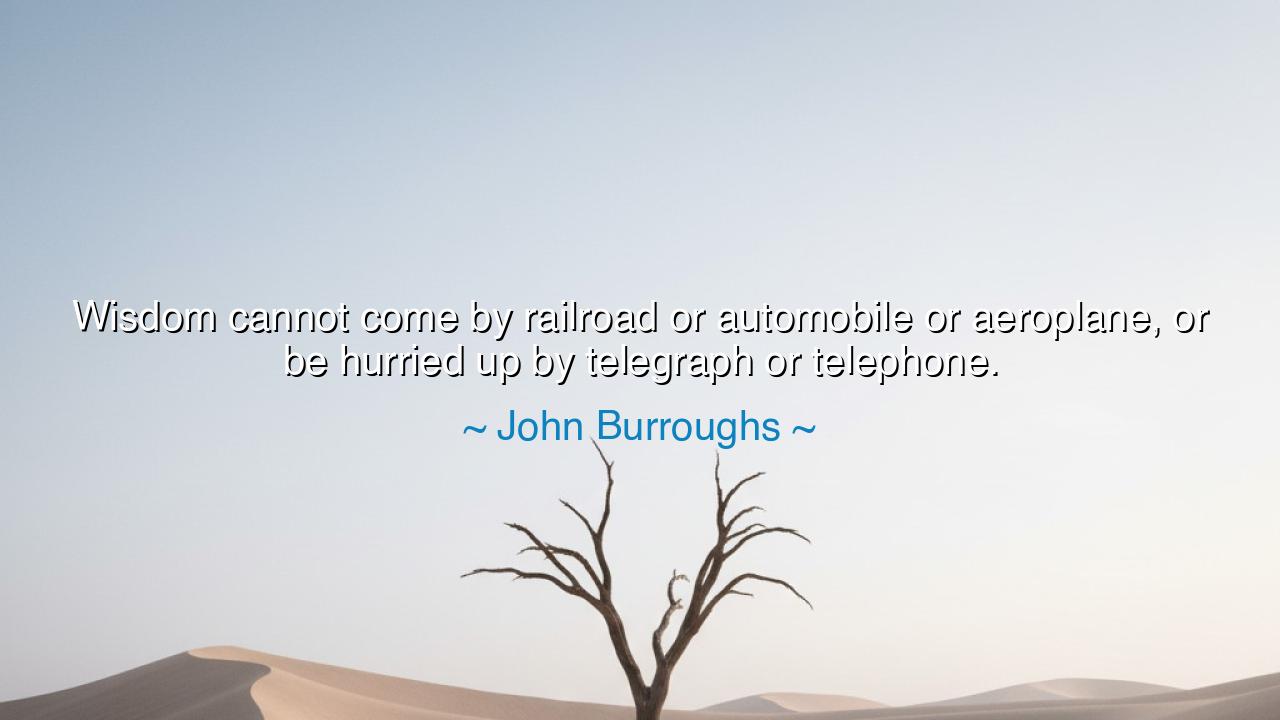
Wisdom cannot come by railroad or automobile or aeroplane, or be
Wisdom cannot come by railroad or automobile or aeroplane, or be hurried up by telegraph or telephone.






Hear me, O children of the future, for I bring to you the words of John Burroughs, who declared: "Wisdom cannot come by railroad or automobile or aeroplane, or be hurried up by telegraph or telephone." These words speak of a truth as ancient as time itself—that wisdom is not something that can be acquired in haste, nor can it be rushed by the relentless march of technology. It is not a commodity to be delivered quickly or easily, but a gift that comes only through the slow and patient cultivation of experience, reflection, and quiet understanding.
Consider the ancient philosophers, who walked the earth in humble pursuit of truth, not in the haste of speed but in the depth of quiet contemplation. Socrates, with his daily dialogues, did not rush to answer the burning questions of life; instead, he asked questions and waited for the wisdom of reflection to unfold in the hearts of those who listened. His teachings were not instant answers but moments of deep pondering that led his students to discover their own truths. Wisdom, for him, came not through quick exchange, but through thoughtful discourse.
In the same vein, the Buddha, who walked the earth long before the age of railroads and airplanes, taught that the path to enlightenment is a journey of slow, deliberate steps. His teachings on mindfulness and meditation emphasize that true wisdom is found not in the noise of the world, but in its silence, in the stillness of the moment. One cannot hurry the journey to self-realization, for it is through patience and observation that the truth of the world reveals itself. The Buddha’s wisdom did not arrive through the swiftness of travel, but in the slow unfolding of awareness.
Even in more recent times, consider the life of Mahatma Gandhi, who understood the power of slow change. In the face of colonial oppression, he did not seek to rush or force an end through quick means. His philosophy of nonviolence and his commitment to truth taught the world that lasting change, and the wisdom to lead it, cannot be rushed. Through his deliberate acts of resistance and reflection, Gandhi showed that the path to wisdom is long, and it requires the patience to understand the deeper currents of life and human nature.
So, O children, remember this: the true wisdom of life is not something that can be hastened by the speed of modern invention or the urgency of the world around you. Wisdom is not something that can be delivered by the swiftness of telegraphs or the roar of airplanes. It is a quiet, patient thing that grows within the soul, nurtured by experience, reflection, and the passage of time. Do not seek to rush through life, for in doing so, you may miss the very lessons that time has to offer. Take the slow path, and in that slowness, you will find the richest wisdom.






DMHoang Dung Music
I think Burroughs’ quote is a beautiful reminder that true wisdom is not something you can rush or force. It’s the result of time, reflection, and life experience. In today’s world, though, I feel like many people are in a hurry to ‘know it all’ quickly. Does this undermine the wisdom that comes from lived experience? Can we still develop wisdom if we don’t take the time to truly process and reflect on what we learn?
HLHoaianh Le
Burroughs’ point about wisdom not coming from technology or speed is thought-provoking, especially in today’s world. We often seek quick answers and fast results, but wisdom requires time and reflection. It makes me ask—can we still foster wisdom in a society obsessed with speed? How do we shift our mindset to value patience and depth over instant knowledge or surface-level answers? Is it possible to slow down in a world that values speed so highly?
MLTra My Le
This quote from Burroughs seems to be a critique of our constant desire to speed up processes, thinking we can somehow accelerate growth and wisdom. The idea that wisdom can’t be hurried is quite profound, yet I wonder, in today’s world of hyperconnectivity and instant feedback, how do we ensure that we’re still allowing for that slower, thoughtful path to wisdom? Does technology help us get closer to wisdom, or does it push us further from it?
MDNgoc Minh Doan
Burroughs’ quote really speaks to the idea that there’s no shortcut to true wisdom. It’s something that has to be earned over time, through experience, and through patience. But I wonder—does the pace of life today make it harder for people to access wisdom? With everything moving so quickly, are we sacrificing depth for efficiency? Can we find a balance between speed and the slower, more deliberate path that wisdom requires?
NLLe Ngoc Linh
I love how Burroughs emphasizes that wisdom can’t be rushed, no matter how fast or efficient our transportation or communication methods become. It’s a reminder to slow down and appreciate the process of learning. But I wonder, can we really afford to slow down in a world that’s constantly pushing us to move faster? Is there still room for deep reflection in our lives, or is it becoming a luxury only some can afford?